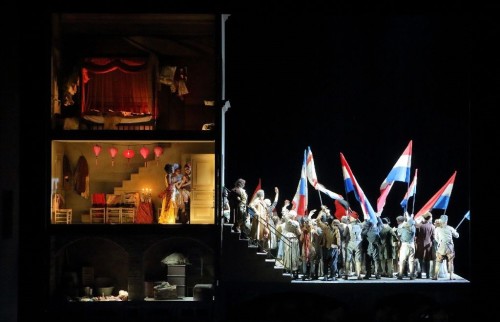 Germany Munich Opera Festival [7] – Giordano, Andrea Chénier: Bayerische Staatsoper Orchestra and Chorus / Omer Meir Wellber (conductor), Nationaltheater, Munich, 28.7.2017. (JMI)
Germany Munich Opera Festival [7] – Giordano, Andrea Chénier: Bayerische Staatsoper Orchestra and Chorus / Omer Meir Wellber (conductor), Nationaltheater, Munich, 28.7.2017. (JMI)

Cast:
Andrea Chénier – Jonas Kaufmann
Maddalena – Anja Harteros
Carlo Gérard – Luca Salsi
Bersi – J’Nai Bridges
Madelon – Elena Zilio
Comtesse di Coigny – Doris Soffel
Roucher – Andrea Borghini
Abate – Ulrich Reß
Incredibile – Kevin Conners
Mathieu – Tim Kuypers
Fléville – Nathaniel Webster
Fouquier-Tinville – Christian Rieger
Schmidt – Anatoli Sivko
Production:
Director – Philipp Stölzl
Sets – Philipp Stölzl & Heike Vollmer
Costumes – Anke Winckler
Lighting – Michael Bauer
There are some operas that do not lend themselves to a modern setting, due to the fact that the libretto is very precise in terms of epoch and even dates: two that come to mind are Tosca and Andrea Chénier. While this Philipp Stölzl production is faithful to the time of the libretto, the French Revolution, it is presented in a way that influences – and not in a positive sense – the end result. As in other Stölzl productions, there are several modules or mini-stages on different levels. Thus in Act I, the lower level introduces the servants, while the upper one hosts the reception at the mansion of the Comtesse di Coigny. The same happens in Act II where there are three levels: Chénier is hidden on the lowest level, while the upper floors are occupied by the café and the Merveilleuses. There are again various levels and small modules in the third act, although for the trial scene they disappear and leave one large stage. Finally, the prison scene takes place in the lower, narrow part of the stage; the upper part holds a guillotine.
There are several problems with this. The audience is distracted by movement in some of the modules while singing is going on in others; and singers in the upper modules are at quite a distance from the prompter, which means the latter is clearly heard, especially in the first two acts. Finally, not all the modules allow for adequate voice projection. Thus the voices suffer in the first act, while in Act II the problem is solved by having Maddalena and Chénier sing their beautiful duet at the front of the stage.
The costumes are suitable and the lighting is good. The stage direction is generally effective, although it doesn’t always work in the crowd scenes.
Omer Meir Wellber’s reading was always correct and, at times, brilliant. There may have been times when the orchestra was too loud, but in general he helped the singers. The orchestra and chorus performed at their usual superb level.
Andrea Chénier was interpreted by Jonas Kaufmann. It was the third time this month that I’ve seen him perform, after Otello in London and La forza del destino here a few days ago. Overall, I think this was the best of the three performances, although I still think that this great tenor is not at 100%. The always much expected ‘Improviso’ was not particularly brilliant; nor did he shine in the arioso of Act II, though he clearly improved in the duet with Maddalena. I liked him more in ‘Si, fui soldato’, and he was good in ‘Come un bel dì di Maggio, but his strongest was the final duet with Maddalena. In short, this was a fine Chénier, if not an exceptional one.
Anja Harteros as Maddalena was the best in the cast: the opera could perfectly and in all justice be called Maddalena di Coigny. She shone in her duets with Chénier and Gérard, and sang a magnificent ‘Mamma morta’. Anja Harteros is a major soprano in the history of opera, and only Anna Netrebko can compete with her today.
Baritone Luca Salsi was a competent Carlo Gérard with a sonorous voice. His biggest problem is that he does not pay much attention to nuances. The aria ‘Nemico della Patria’ was sung at forte and with open sounds, but it seemed to delight the audience.
Bersi was well played by mezzo-soprano J’Nai Bridges. She has an attractive voice but her singing from the upper modules did not always reach the audience.
Elena Zilio was once again Madelon and she did well, as did Doris Soffel as the Countess of Coigny. Kevin Conners was a good Incredibile, and so was Andrea Borghini as Roucher. Tim Kuypers was a sonorous Mathieu, and Ulrich Reß a correct Abate.
José M. Irurzun
